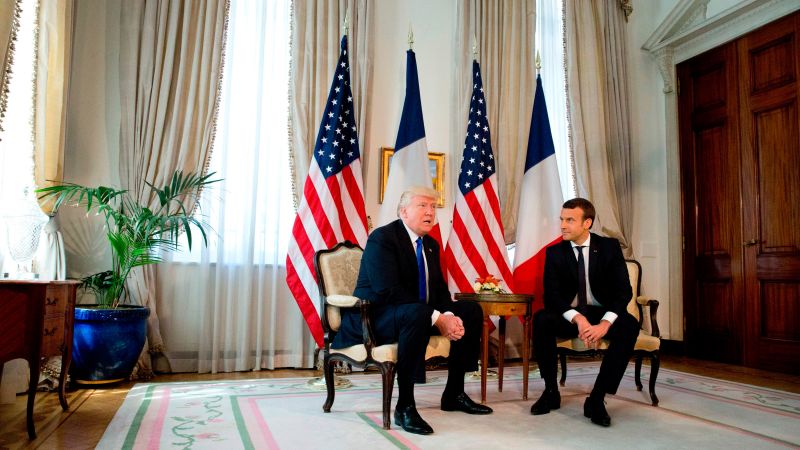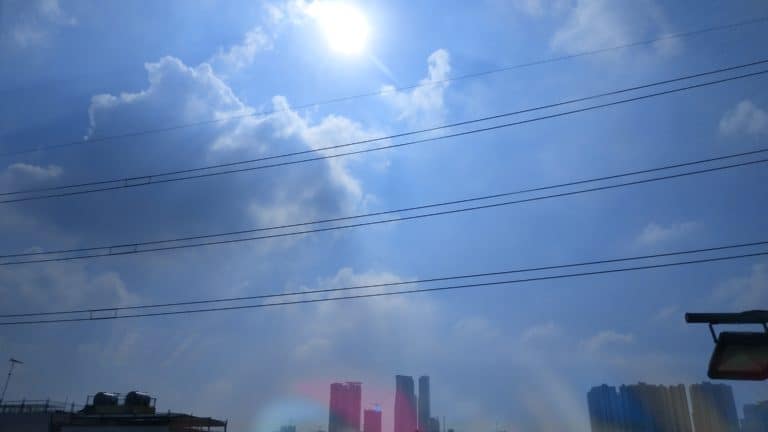
There’ll be a strong sense of déjà vu when French President Emmanuel Macron lays the flattery on thick for Donald Trump in Paris this weekend. Few foreign leaders did more to woo Trump when he was the 45th president. In fact, Macron treated him with such deference at a Bastille Day parade on the Champs-Élysées that Trump came home wanting a military parade of his own — on July Fourth.
As Trump prepares to become the 47th president, Macron has surpassed himself, inviting Trump to attend the year’s most vaunted opening — the unveiling of the newly restored Notre Dame Cathedral five years after a savage fire. Putting Trump at the center of the star-studded VIP event, which will mark his big return to the global stage, says everything about the power fast flowing back to the president-elect six weeks before he begins his second term. Trump isn’t waiting until January to launch his new foreign policy — he’s already threatened a trade war with Canada and Mexico and showed who is boss when Canadian Prime Minister Justin Trudeau rushed to Florida to appease him last week.

And on Monday, he warned that there will be “ALL HELL TO PAY” in the Middle East if Hamas doesn’t release hostages in Gaza before Inauguration Day. Trump’s starring role in Paris will also mark a poignant contrast with Joe Biden’s increasingly ignominious long goodbye. The president came under fierce criticism Monday, even from within his own party, after he pardoned his son Hunter, undercutting a core principle of his term — that everyone is equal before the law.
“He didn’t need to tell the American public, ‘I will not do this’ and he did ...
and when you made a promise, you gotta keep it,” Virginia Democratic Sen. Tim Kaine told CNN’s Manu Raju. Utah Republican Sen.
Mitt Romney added: “It was a terrible decision and it just made me heart sick.” The announcement of Trump’s trip to Paris came as Biden landed in Angola for an official presidential visit that is sure to include far more substance than Trump’s journey. The president seeks to highlight US commitment to sub-Saharan Africa in the face of China’s investment-led regional power play.
Trump never made it to Africa as president and seemed more interested in insulting the continent than helping it. Biden’s visit will also showcase one of the most successful US global policies in decades – the massive program fighting HIV/AIDS in Africa that faces an uncertain future when Trump returns to the White House. But the president-elect’s far more visible jaunt to the City of Light will stress how he is again the American that foreign leaders want to court as Biden increasingly fades from the international scene.
Trump’s win presented every global leader with a dilemma Perhaps most significantly, Trump’s trip will highlight the dilemma with which every world leader is wrestling: how to deal with a new American president who is certain to be more aggressive and capricious on the world stage than he was even in his first turbulent term — and who often prefers the company of tyrants over allies. The president-elect is reveling in his return to the international spotlight after news broke of Macron’s invitation Monday. “President Emmanuel Macron has done a wonderful job ensuring that Notre Dame has been restored to its full level of glory, and even more so.
It will be a very special day for all!” Trump wrote on his Truth Social platform. The trip promises all that the president-elect most appreciates. A chance to seize the spotlight; the adulation of being an honored guest; and the fanfare of being part of a unique spectacle likely to attract millions of eyeballs across the globe.
It’s also the kind of eye-catching gambit for which Macron is known — but that sometimes comes unstuck. The French president’s impulsive gesture earlier this year, for example, to call snap parliamentary elections backfired spectacularly and plunged the country into a governing crisis. Macron’s invitation is the latest move in the never-ending tussle among European powers to be Washington’s top conduit on the other side of the Atlantic.
Macron has long sought to position France as the dominant European power — especially since the retirement of former German Chancellor Angela Merkel, who was promoting her memoirs in Washington on Monday night alongside former President Barack Obama, who in 2016 urged her to save the West from Trump. Trump’s second coming has sparked a similar sense of crisis among Western powers, who are worried that he will desert Ukraine in order to please his friend, Russian President Vladimir Putin, amid rising expectations that the president-elect will threaten massive tariffs against the European Union. There’s also concern that Trump will fracture NATO in his second term, after he said on the campaign trail that he’d tell Russia it could do “whatever the hell they want” to alliance members that don’t meet guidelines for minimum defense spending.
Macron, by deploying the power of symbolism and pulling off the coup of a first foreign visit even before Trump retakes office, seems to have a head start on his rivals. There’s little competition from Germany, where Chancellor Olaf Scholz seems destined to soon follow Biden into the political wilderness after the collapse of his governing coalition with an election set for February. New British Prime Minister Keir Starmer is stronger but has a balancing act as Trump is deeply unpopular in his ruling Labour Party.
And Britain lacks European clout after it left the EU in a populist outburst that delighted Trump and foreshadowed his 2016 victory. Macron, hugely unpopular deep into his second term, is not the force he once was either. His invitation to Trump is rich in irony since the far-right Trump-friendly National Rally Party is threatening to topple Prime Minister Michel Barnier in a move that would further weaken the president and cause even more disarray.
There are growing signs that Macron’s legacy might end up mirroring Biden’s — as a president forced to hand over power to nationalist, populist forces he defined his administration as fighting against. Far-right leader Marine Le Pen, whose anti-immigrant ideology is similar to Trump’s, may have her best shot yet at making it through France’s two-stage presidential election system to win power in 2027. How the first-term bromance went all wrong Macron’s daring new overture to Trump is likely to trigger an outpouring of mutual praise.
But if history is anything to go by, it won’t last. The first time around, the Macrons and the Trumps dined at the Michelin-starred Jules Verne restaurant at the Eiffel Tower, whispered to one-another at the Bastille Day parade, then kissed and held hands at the White House. In the Oval Office in April 2018, Trump said, “We have to make him perfect, he is perfect,” as he brushed what he said was dandruff off the French president’s shoulder.
“Emmanuel will go down as one of your great presidents,” Trump told the French people. The bromance didn’t last, however, as Trump’s hostility to Europe got in the way. Things really went off the rails during a visit by the US leader to France later in 2018.
Trump reacted poorly to Macron’s push for a European army — ironically, a partial response to the US leader’s frequent complaints about the need for American taxpayers to bankroll the continent’s defense. Trump called the idea “very insulting,” later mocked Macron’s “very low approval rating in France, 26%” and tweeted support for his nationalist foes. While Trump seems prepared to give it another shot, Macron — who, like Biden, styles himself as a protector of democracy and a bulwark against far-right nationalism — is far from the president-elect’s favorite European leader.
That honor belongs to Hungarian Prime Minister Viktor Orbán, a frequent guest at Mar-a-Lago, whose blueprint for eroding democracy, curtailing press freedom and politicizing justice is far more to Trump’s taste. “Some people don’t like him because he’s too strong,” Trump said during a rally in New Hampshire during his primary campaign in January. “It’s good to have a strong man at the head of a country.
” Still, both Macron and Trump place great importance on relationships between foreign leaders — so perhaps they can rekindle the spark where it all began. Trump will arrive in Paris shortly after selecting Charles Kushner, the father-in-law of his daughter Ivanka as the next US ambassador to France. On the one hand, this pick might be seen by some as an insult to America’s longest diplomatic friendship since Kushner was convicted of tax evasion and witness retaliation charges and was pardoned by Trump.
But the French long ago perfected the art of diplomatic discretion, and in some ways, Kushner’s selection might be seen as a compliment — he is, after all, family for Trump — and therefore has his ear. Kushner’s appointment may also offer the chance of a reentry to high society, on the world’s most glittering diplomatic circuit, for Ivanka Trump and her husband Jared Kushner, who now live in Florida, far from their former haunts in Manhattan where the name Trump became anathema to elite liberal chattering classes..














